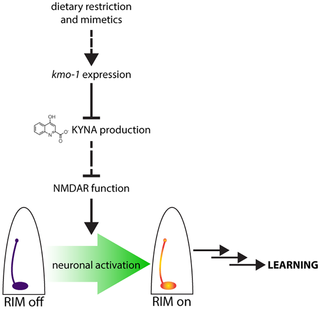PLOS Biology ( IF 7.8 ) Pub Date : 2017-08-01 , DOI: 10.1371/journal.pbio.2002032 Mihir Vohra , George A. Lemieux , Lin Lin , Kaveh Ashrafi

|
In species ranging from humans to Caenorhabditis elegans, dietary restriction (DR) grants numerous benefits, including enhanced learning. The precise mechanisms by which DR engenders benefits on processes related to learning remain poorly understood. As a result, it is unclear whether the learning benefits of DR are due to myriad improvements in mechanisms that collectively confer improved cellular health and extension of organismal lifespan or due to specific neural mechanisms. Using an associative learning paradigm in C. elegans, we investigated the effects of DR as well as manipulations of insulin, mechanistic target of rapamycin (mTOR), AMP-activated protein kinase (AMPK), and autophagy pathways—processes implicated in longevity—on learning. Despite their effects on a vast number of molecular effectors, we found that the beneficial effects on learning elicited by each of these manipulations are fully dependent on depletion of kynurenic acid (KYNA), a neuroinhibitory metabolite. KYNA depletion then leads, in an N-methyl D-aspartate receptor (NMDAR)-dependent manner, to activation of a specific pair of interneurons with a critical role in learning. Thus, fluctuations in KYNA levels emerge as a previously unidentified molecular mechanism linking longevity and metabolic pathways to neural mechanisms of learning. Importantly, KYNA levels did not alter lifespan in any of the conditions tested. As such, the beneficial effects of DR on learning can be attributed to changes in a nutritionally sensitive metabolite with neuromodulatory activity rather than indirect or secondary consequences of improved health and extended longevity.
中文翻译:

饮食限制对学习的有益作用不同于其对长寿的影响,并且是由神经抑制代谢物的消耗介导的
在从人类到秀丽隐杆线虫的物种中,饮食限制(DR)可以带来许多好处,包括增强学习能力。灾难恢复在与学习相关的过程中受益的精确机制仍然知之甚少。结果,尚不清楚DR的学习益处是由于共同改善细胞健康和延长生物寿命的机制的无数改进,还是由于特定的神经机制。在C语言中使用联想学习范式。线虫,我们研究了DR以及胰岛素的操纵,雷帕霉素(mTOR)的机械靶标,AMP激活的蛋白激酶(AMPK)的作用以及长寿牵连的自噬途径对学习的影响。尽管它们对大量分子效应物有影响,但我们发现,这些操作中的每一种对学习的有益作用完全取决于神经抑制代谢产物健尿酸(KYNA)的消耗。然后,KYNA耗竭以N-甲基D-天冬氨酸受体(NMDAR)依赖性方式导致特定一对中间神经元的激活,在学习中起关键作用。因此,KYNA水平的波动作为将寿命和代谢途径与学习的神经机制联系起来的先前未知的分子机制而出现。重要的,在任何测试条件下,KYNA水平均不会改变使用寿命。因此,DR对学习的有益作用可归因于具有神经调节活性的营养敏感代谢产物的变化,而不是健康改善和寿命延长的间接或继发性后果。











































 京公网安备 11010802027423号
京公网安备 11010802027423号